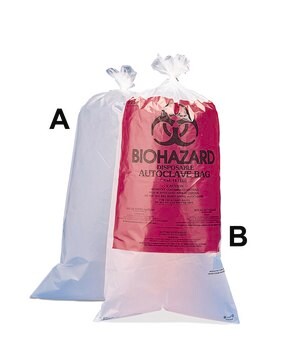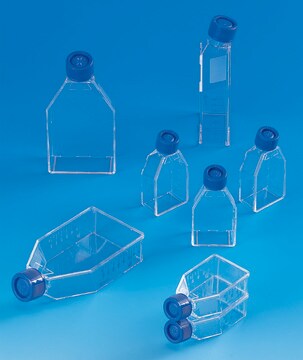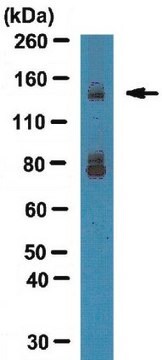79189
Abberior® FLIP 565, NHS-ester
for single-molecule switching microscopy (e.g. PALM, STORM, GSDIM)
Anmeldenzur Ansicht organisationsspezifischer und vertraglich vereinbarter Preise
Alle Fotos(1)
About This Item
UNSPSC-Code:
12352200
Empfohlene Produkte
Form
solid
Konzentration
≥60.0% (degree of coupling)
Löslichkeit
DMF: 1 mg/mL, clear
Fluoreszenz
λem 580 nm±5 nm in PBS, pH 7.4
Lagertemp.
−20°C
Allgemeine Beschreibung
Absorption Maximum (off-state) λmax:314 nm (PBS, pH 7.4)
Extinction Coefficient, ε(λmax): 47,000 M-1cm-1 (MeOH)
Fluorescence Maximum, λfl:580 nm (PBS, pH 7.4)
Photoactication Wavelength: 310-380 (one-photon activation)
650-800 (two-photon activation)
Fluorescence Quantum Yield, η: 0.38 (PBS, pH 7.4)
Extinction Coefficient, ε(λmax): 47,000 M-1cm-1 (MeOH)
Fluorescence Maximum, λfl:580 nm (PBS, pH 7.4)
Photoactication Wavelength: 310-380 (one-photon activation)
650-800 (two-photon activation)
Fluorescence Quantum Yield, η: 0.38 (PBS, pH 7.4)
Anwendung
Abberior® FLIP 565 conjugated with secondary antibody has been used for STORM (stochastic optical reconstruction microscopy) imaging of COS-7 and S180 cells.
Eignung
Designed and tested for fluorescent super-resolution microscopy
Sonstige Hinweise
Rechtliche Hinweise
abberior is a registered trademark of Abberior GmbH
Ähnliches Produkt
Produkt-Nr.
Beschreibung
Preisangaben
Lagerklassenschlüssel
13 - Non Combustible Solids
WGK
WGK 3
Flammpunkt (°F)
Not applicable
Flammpunkt (°C)
Not applicable
Analysenzertifikate (COA)
Suchen Sie nach Analysenzertifikate (COA), indem Sie die Lot-/Chargennummer des Produkts eingeben. Lot- und Chargennummern sind auf dem Produktetikett hinter den Wörtern ‘Lot’ oder ‘Batch’ (Lot oder Charge) zu finden.
Besitzen Sie dieses Produkt bereits?
In der Dokumentenbibliothek finden Sie die Dokumentation zu den Produkten, die Sie kürzlich erworben haben.
Remi Galland et al.
Nature methods, 12(7), 641-644 (2015-05-12)
Single-objective selective-plane illumination microscopy (soSPIM) is achieved with micromirrored cavities combined with a laser beam-steering unit installed on a standard inverted microscope. The illumination and detection are done through the same objective. soSPIM can be used with standard sample preparations
S W Hell et al.
Optics letters, 19(11), 780-782 (1994-06-01)
We propose a new type of scanning fluorescence microscope capable of resolving 35 nm in the far field. We overcome the diffraction resolution limit by employing stimulated emission to inhibit the fluorescence process in the outer regions of the excitation
Marcus Dyba et al.
Nature biotechnology, 21(11), 1303-1304 (2003-10-21)
We report immunofluorescence imaging with a spatial resolution well beyond the diffraction limit. An axial resolution of approximately 50 nm, corresponding to 1/16 of the irradiation wavelength of 793 nm, is achieved by stimulated emission depletion through opposing lenses. We
Tim Grotjohann et al.
Nature, 478(7368), 204-208 (2011-09-13)
Lens-based optical microscopy failed to discern fluorescent features closer than 200 nm for decades, but the recent breaking of the diffraction resolution barrier by sequentially switching the fluorescence capability of adjacent features on and off is making nanoscale imaging routine. Reported
Stefan W Hell
Nature biotechnology, 21(11), 1347-1355 (2003-11-05)
For more than a century, the resolution of focusing light microscopy has been limited by diffraction to 180 nm in the focal plane and to 500 nm along the optic axis. Recently, microscopes have been reported that provide three- to
Unser Team von Wissenschaftlern verfügt über Erfahrung in allen Forschungsbereichen einschließlich Life Science, Materialwissenschaften, chemischer Synthese, Chromatographie, Analytik und vielen mehr..
Setzen Sie sich mit dem technischen Dienst in Verbindung.





